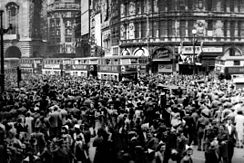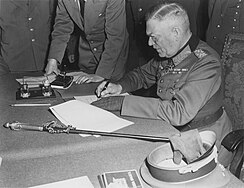History
[edit]Adolf Hitler, the Nazi leader, had committed suicide on 30 April during the Battle of Berlin, and Germany's surrender was authorised by his successor, Reichspräsident Karl Dönitz. The administration headed by Dönitz was known as the Flensburg Government. The act of military surrender was first signed at 02:41 on 7 May in SHAEF HQ at Reims,[2] and a slightly modified document, considered the definitive German Instrument of Surrender, was signed on 8 May 1945 in Karlshorst, Berlin at 22:43 local time.
Upon the defeat of Germany, celebrations erupted throughout the Western world, especially in the United Kingdom, in North America and in USSR. More than one million people celebrated in the streets throughout the UK to mark the end of the European part of the war. In London, crowds massed in Trafalgar Square and up the Mall to Buckingham Palace, where King George VI and Queen Elizabeth, accompanied by their daughters and Prime Minister Winston Churchill, appeared on the balcony of the palace before the cheering crowds. Churchill went from the palace to Whitehall, where he addressed another large crowd:[3]


Churchill asked Ernest Bevin to come forward and share the applause. Bevin said, "No, Winston, this is your day", and proceeded to conduct the people in the singing of "For He's a Jolly Good Fellow".[3] Later, Princess Elizabeth (the future Queen Elizabeth II) and her sister Princess Margaret were allowed to wander incognito among the crowds and take part in the celebrations.[4] The 2015 film A Royal Night Out was inspired by Elizabeth and Margaret mingling with the public that night.[citation needed]
In the United States, the event coincided with President Harry S. Truman's 61st birthday.[5] He dedicated the victory to the memory of his predecessor, Franklin D. Roosevelt, who had died of a cerebral hemorrhage less than a month earlier, on 12 April.[6] Flags remained at half-staff for the remainder of the 30-day mourning period.[7][8] Truman said of dedicating the victory to Roosevelt's memory and keeping the flags at half-staff that his only wish was "that Franklin D. Roosevelt had lived to witness this day".[6] Later that day, Truman said that the victory made it his most enjoyable birthday.[5] Great celebrations took place in many American cities, especially in New York's Times Square.[9]
Tempering the jubilation somewhat, both Churchill and Truman pointed out that the war against Japan had not yet been won. In his radio broadcast at 15:00 on 8 May, Churchill told the British people, "We may allow ourselves a brief period of rejoicing (as Japan) remains unsubdued".[10][11] In America, Truman broadcast at 09:00 and said it was "a victory only half won".[12]
On the same day in 1945, Muslims in French Algeria celebrating the end of the war (of which some were also peacefully protesting for independence) became the targets of violence and massacres by colonial authorities and pied-noir settler militias, which would last until 26 June 1945.[13][14][15] While details of the killings were largely overlooked in metropolitan France, the impact on the Algerian Muslim population was traumatic, especially on the large numbers of Muslim soldiers in the French Army who were then returning from the war in Europe.[16] Nine years later, the Algerian War began, leading to independence from France in March 1962.[17] In February 2005, Hubert Colin de Verdière, France's ambassador to Algeria, formally apologized for the massacre, calling it an "inexcusable tragedy".[18][19]





No comments:
Post a Comment